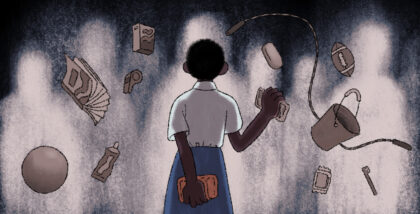Adi was founded on the belief that political writing should be rooted in lived experience, allowing the texture of everyday life to illuminate structural issues—what C. Wright Mills termed the “sociological imagination.” This principle may be especially well-suited to fiction writing, where imagined lives are potent carriers of insight, and invention is a conduit for truth.
So, for Issue 9, we are pleased to present an all-fiction edition, sourced entirely from an open call and accompanied by Sarula Bao’s luminous illustrations. The response to our request for stories that explore lives impacted by politics was thrilling: we received more than 300 submissions that stretched, challenged, and expanded the notion of “political fiction.” Many thanks to all who shared work; we’re hugely appreciative, and choosing just a handful was a formidable task.
From an eerie desert road trip to a couple’s ruthless quest to conceive, the stories we selected coalesce (unexpectedly!) around vital themes: agency, exploitation, and the ways in which women’s bodies both wield and yield to power. They are also funny, poetic, surreal, beguiling, impassioned, devastating. In “Visitors Day,” Lutivini Majanja presents a tragicomic glimpse into life at an orphanage in Kenya, where children endure the spectacle of philanthropy. “When the photographers said “smile,” the children waved bars of soap, packets of biscuits, exercise books, and two footballs,” she writes. On a sunbaked road trip through the American southwest, the narrator of Zeynep Lokmanoglu’s story, “Near-Boiling,” encounters “men with guns in their pants,” “things that howl and whisper,” and the machinations of her own mind, surfacing the dual presence of fear and freedom accompanying a woman traveling alone.
Karolina Zapal’s “Giving Birth, Giving Death,” finds a woman transformed by grief over her daughter’s death as she navigates healthcare bureaucracy and restrictions on reproductive rights in Poland. “Pani could not finish her sentences because there was nothing left to say. The endings had fallen out of her purse and tripped understanding, allowing fear to pull ahead.” And in “Rozi,” Beenish Ahmed reimagines the story of Sarah, Abraham, and their maidservant Hagar through contemporary Pakistani characters, whose efforts to have a child are searingly intertwined with issues of wealth, class, and consent. “She told him that they could say they were searching for a new maid. They’d offer enough money that the girl couldn’t refuse,” writes Ahmed. The politics of reproduction also echo through Conceição Evaristo’s “Natalina’s Children,” translated from the Portuguese by Meg Weeks. “If this belly had a price, she had paid it herself in precious currency,” writes Evaristo, conjuring a woman whose body is—as they so often are—the locus of both repression and resistance.
—Meara Sharma, editor-in-chief
In this Issue

Giving Birth, Giving Death
The prayers were unfinished, like she was, and what is sent unfinished to heaven—a life—becomes sacred in its mystery.

Natalina’s Children
She was eager to see this child who wouldn’t bear the traces of anyone, perhaps not even of her.


Visitors Day
When the photographers said “smile,” the children waved bars of soap and packets of biscuits.

A Soundtrack To Issue 9
The fictional characters of Adi’s latest issue, HER TRACES, are attuned to careful listening.


















